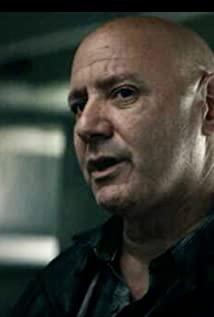(The original text is contained in the public account [Chang Han], and the content of the article is prohibited from being reproduced without the permission of the author!)
It's a very simple story, the values conveyed are not unfamiliar, and the plot is old-fashioned, but I can't help but like it.
Doctor: "Your hearing loss is irreversible, and you must understand that your primary responsibility now is to maintain the only hearing you have."
Rubin, a bohemian, tattooed young American rock boy, suddenly lost his hearing during a tour with his lead singer girlfriend. The sudden blow made him have to give up music, and his behavior began to become erratic. He was impatient and angry, At a loss, unwilling to accept the reality, he even deceived himself and told his girlfriend that there was still a way to restore his hearing; he kept asking the doctor, "What should we do? How can I recover?"
Facing the irreversible reality, we are fragile and hope that "I can recover, I can return to the past", Rubin repeats this sentence constantly, constantly firming up the confidence to return to the past. .
At the suggestion of a friend, Rubin and his girlfriend came to a hearing-impaired community, hoping to get treatment. However, for Rubin, who was bent on restoring the past at this time, it was only a temporary stop. He refused the help from the community leader Qiao at the beginning, and was stubbornly unwilling to accept the established facts, but in the middle of the half-assistance, the life of the hearing-impaired community changed him for a time. He gradually became one with the members and was welcomed by the children. , He also learned sign language quickly. He accepted Qiao's suggestion and began to pick up paper and pen to write... If the plot continues to develop in such a healthy way, this film will become a chicken soup drama, and the discussion will be of little significance. , and one of the reasons why his director is praised is that he maintains the reality of the film:
Lu couldn't bear the pressure and chose to return to France, while Rubin couldn't let go of his relationship with Lu, and began to secretly check Lu's status on the Internet (a careful audience will find that Rubin's two changes in the community in the movie were due to the Internet). When he saw Lu's current situation, he became anxious and panicked. He was worried about losing Lu's love, and worried that he would be forgotten. When he saw Lu alone, he completed the album singing. He doubted the value of self-existence . Healed old emotions in the community raised their heads again, he found that he couldn't stay here, he had to make changes, to repair himself, to grab the last straw that could go back to the past - hearing aid implantation into surgery.
He felt very confident that if I regained my hearing, I would be able to find love and return to the journey of making music for the two of them.
In order to be able to complete the expensive surgery, he sold everything, bid farewell to the community, and waited for the restoration of his hearing. But when the operation was over, he frowned and heard only a twisted sound mixed with a harsh electric noise. The doctor told him that the implant was just to make your head think it heard a sound, but your ears still can't hear it— - Hearing could never be restored , he finally realized painfully that this straw was just duckweed, and the hope he tried to seize was actually a fake for comfort! Those expensive equipment, like a drop in the bucket, took away everything he had!
Of course, it seems that it is not all, he still has the last straw - love.
"You are smiling, I am crying, you will leave, I have loved you" - the song sung by the female lead is a true portrayal of the male lead.
The cruelty of reality went around in a circle, and finally hit the soft underbelly of human beings - love
If you look closely, you can actually see the fragility of this relationship from the clues in the film, and you can imagine what this relationship will look like after going through great changes, but Rubin, who is in it, has lost his rationality. Judgment, the continuous blows made him see the fragile love as the last hope.
He travels thousands of miles, looking forward to reconnecting with his girlfriend, who shared his dream with him. As you can imagine, Lu is not interested in Rubin's plan to return to the past. She already has a new life here, and she is not interested in the current As far as Lu is concerned, the past time is only suitable for remembrance.
In the last two shots, they were lying on the bed, crying and saying the touching dialogue:
"It's okay, lou"
"What?"
......
"It's okay"
"What's okay?
......
"You saved my life...you made it beautiful" "So it's okay"
"What...why are you saying this?"..."You saved my life too, Rubi."
The shining point of human nature was revealed in Rubin's body at this time. He gave up everything before walking to his lover. What awaited him was his lover's change of heart. After many blows, he was finally no longer the same as when he was just deaf. He was just a long time ago . She was in a trance for a while, and then said "It's okay..." to her. At this time, the endless emotions in her heart only turned into the kindness and tenderness of human nature, so that each other who could not bear to hurt each other was relieved.
The lovers, who were finally strangers, embraced each other in the last night.
It is too narrow to discuss the right and wrong of the two sides in the relationship at the end of the film. Just like the last dialogue between the two, Rubin's letting go freed Lu, allowing her to return to her familiar and comfortable environment, and no longer hurt herself. Forcing Rubin to go to the hearing-impaired community also made Rubin a success. In the end, he learned to accept reality and transcended it, taking his own destiny in his own hands.
Both save each other, which is the great thing about love.
"It's okay, that's life, it's just a damn process!"
- Rubin
The values conveyed by the film are not mysterious. For example, the previous "Spiritual Journey" is actually talking about one thing. To borrow a sentence from Harvard's happiness class Tal: the achievement of the plan itself does not bring happiness, but the goal of having a goal. people are happy. Happiness is living in the moment and enjoying the process. When you just stare at the goal and run hard and ignore the scenery along the way, you also miss happiness. Rubin believes that his experience in the hearing-impaired community is just a process and a stop to accomplish his goal (returning to a normal life in the past), but he does not know that the process itself is where happiness lies.
Learn to accept the status quo, not to waste the moment, to take the current failure as an opportunity to grow, to deal with it positively, and inner peace will follow.
Joe: "You don't need to fix anything!"
- The last thing people want to accept is the helpless thing
Returning to the title of the article, we can’t be rational forever, just because we are all ordinary people like Rubin, we instinctively escape when we encounter setbacks, are reluctant to accept the truth, or confidently believe that we can change the status quo, even if The result is a wall on all sides, and although initiative has its important value, the problem is:
How to tell if something is "can" or "can't" after a problem occurs?
How do you control your emotions and keep them positive?
In the film, Rubin knew for the first time that his hearing could not be restored, but he chose to fight against it and did not admit the fact. We need to understand the degree of this, and these degrees can only be summed up and constructed by the pits that we have traversed in life. As the time-honored prayer goes:
Lord, grant me the peace to accept what I cannot change;
give me the courage to change what I can;
Give me the wisdom to distinguish between the two.
Although life is hard, tossing is also the joy of life, isn't it?
Postscript: Good works can continue to nourish human beings, and we can also extract a variety of viewpoints from them. The above are just my immediate feelings after watching it on the evening of the 23rd. There must be many points that can be expanded. I think of some from time to time.
1. Some of Joe's operations in the community are very psychologically reasonable, such as Joe making the upset Rubin sit in the room every day to write. In fact, it coincides with the experimental results of psychologist Sonja Lyubomirsky - dealing with negative things such as pain and anxiety, writing (analyzing) this experience and sharing (telling) this experience with others can effectively improve our mood. , let's enter an upward spiral without getting worse. (For positive emotions, it is better to reproduce in the brain than to analyze)
2. The views on disability in the film are worth learning from. We should not fall into perfectionistic thinking - thinking that disability is a disability and needs to be constantly repaired. It is very important to accept that handicap, like height, shortness, fatness and thinness, is unique to each person and cannot be compared. Only when we transform the inherent cognitive "objective facts" into "subjective explanations" can we better accept ourselves and better grasp the present.
3. If experiencing loss brings untold pain, should we not have it in the first place? ——Of course not. Failure is the most important nutrient for personal growth. If you don’t experience it, you will not achieve anything. Interestingly, experiencing huge failures and experiencing huge successes have similar effects on happiness, because whether goals are achieved or not does not affect happiness in the long term, it is important to live actively in the present.
4. The filming method is very interesting. The silent scene in the last minute and a half at the end is reminiscent of the "quiet moments" that Joe said to the male protagonist. In addition, in terms of expression, the film is mixed with a lot of hearing impairments. The audio clips are novel and educational. As for when to add hearing-impaired clips when editing, and when to restore normal hearing, it is the director's skill. If you analyze it in detail, you should be able to learn a lot from it. above.
Image taken from movie screen shot
The original text is contained in the personal public account [Chang Han], and movie lovers are welcome to pay attention
The content of the article cannot be reproduced without the permission of the author!
View more about Sound of Metal reviews











